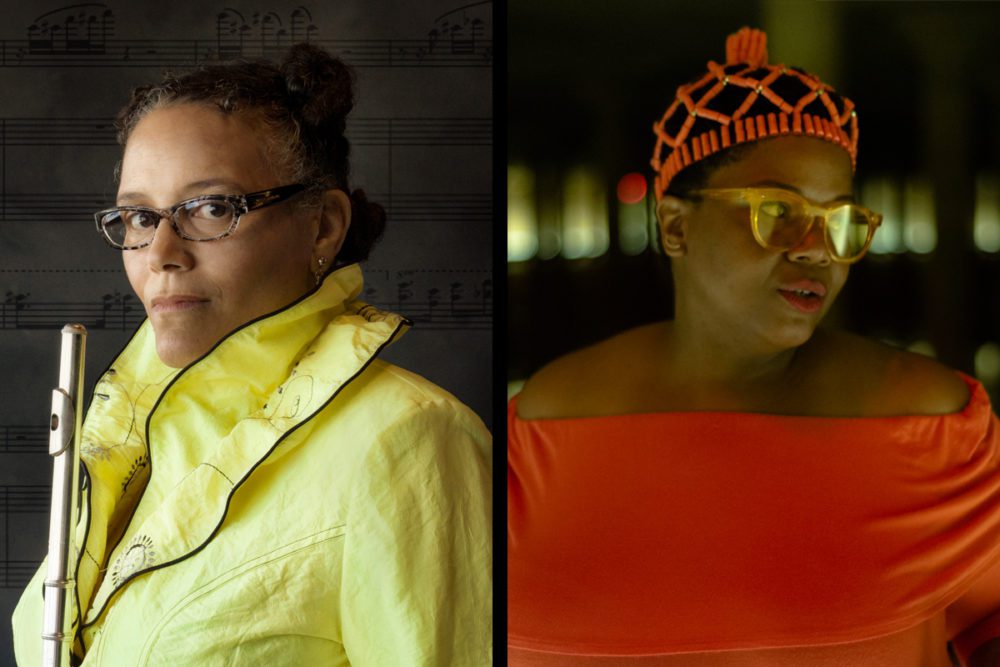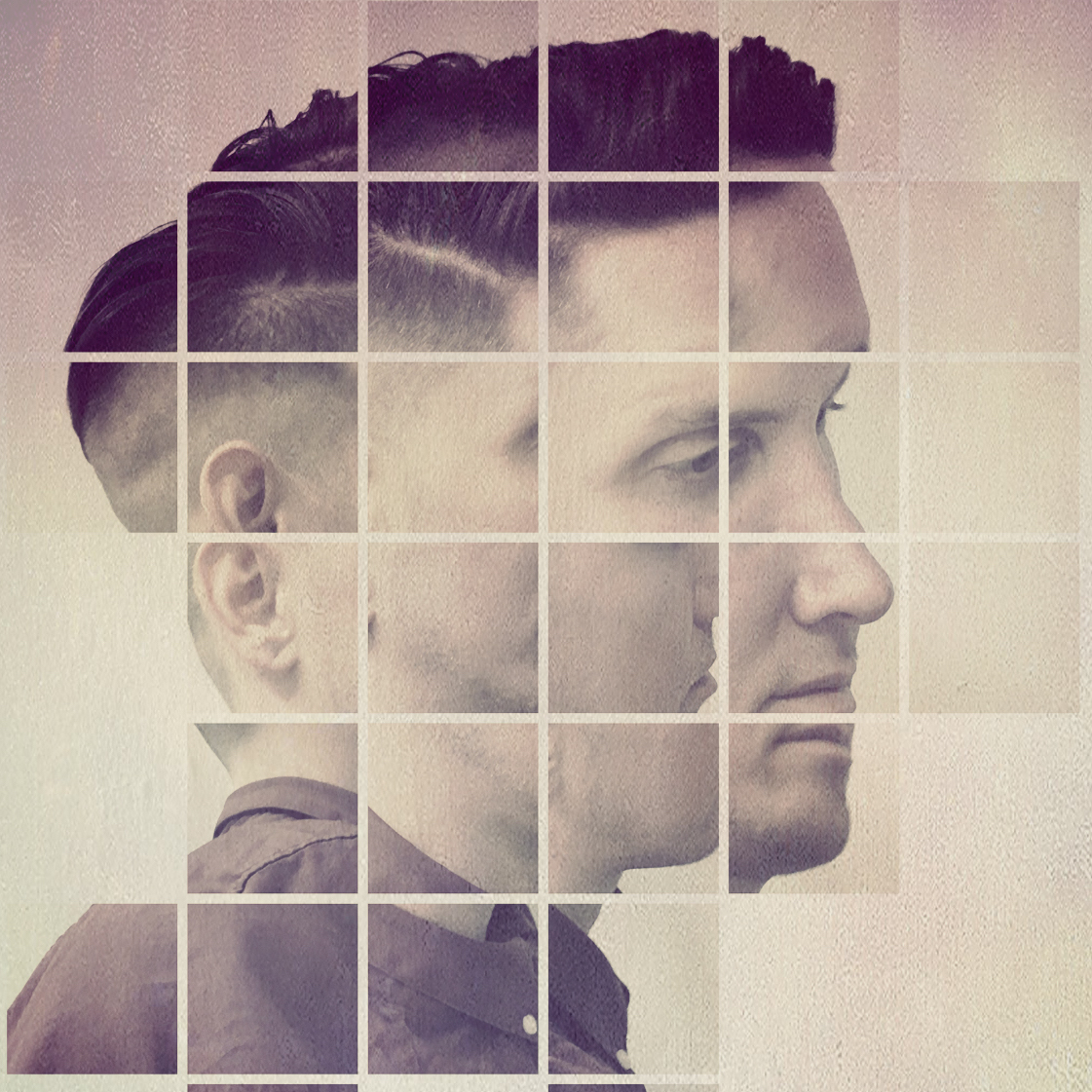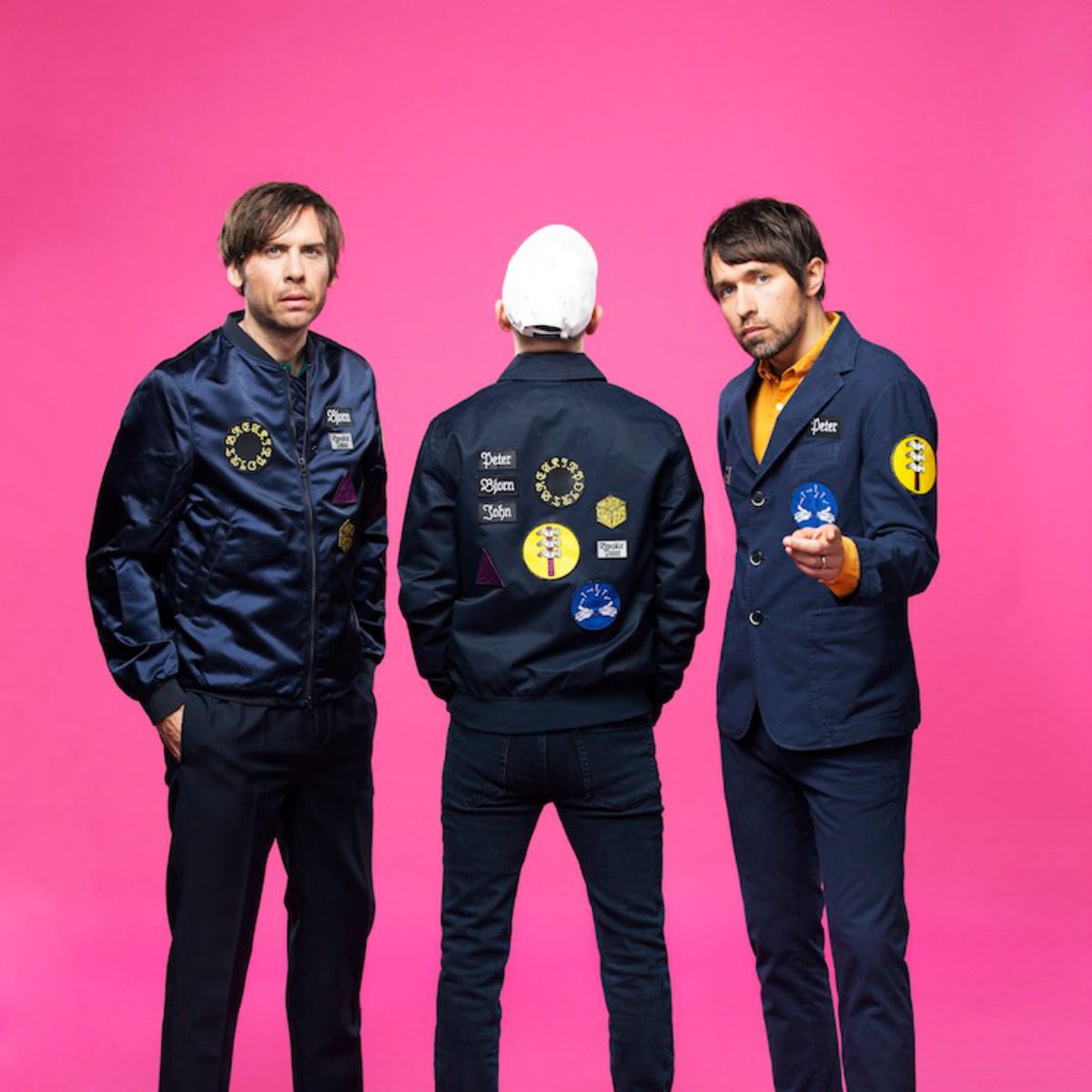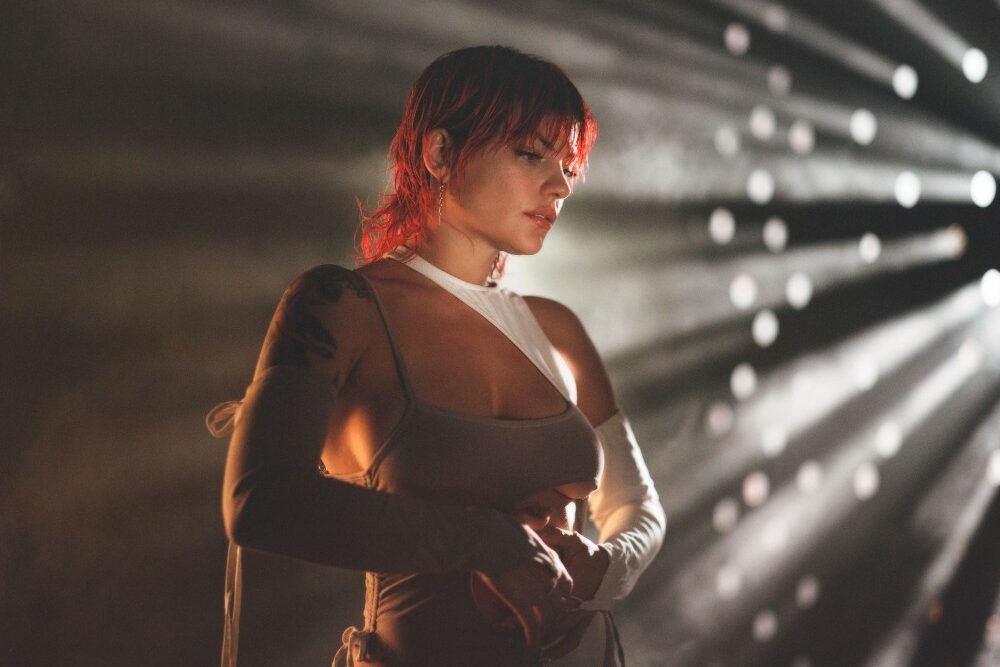

Using a mixture of performance art, experimental opera, free improvisation, and literary composition, artists Lisa E. Harris and Nicole Mitchell have created EarthSeed, a ten-song album recorded during a live performance and inspired by the groundbreaking works of Octavia Butler—one of the only prominent Black female science fiction writers and an early pillar of the Afrofuturist movement. EarthSeed drops on June 26th via Oak Park Illinois-based label FPE Records, only four days after what would’ve been Butler’s 73rd birthday.
It wasn’t the first time Mitchell had used Butler’s work as source material for her own compositions; the flautist had already released Xenogenesis Suite and Intergalactic Beings in 2008 and 2014, respectively. Harris, too, had stumbled upon Butler’s work while composing an opera about Lilith. When the two met at the New Quorum Composers’ Residency in New Orleans, a collaboration felt almost destined.
For EarthSeed, Harris and Mitchell were inspired by two of Butler’s books in particular: Parable of the Sower (1993) and Parable of the Talents (1998), which center around a Black female protagonist, Lauren Oya Olamina, and her original spiritual practice, which she calls Earthseed. These books are also set in Butler’s eerily prophetic vision of the 2020s—a world stained with climate change, greed, and led by a morally-bankrupt business mogul turned politician—an alarming coincidence which Harris and Mitchell also weave into the urgent, and very often somber, tone of EarthSeed.
Harris and Mitchell were drawn to the idea of bringing sound to the truthful frequency of Butler’s work: the juxtaposition between the seemingly unfathomable world Butler envisioned and the world we have in 2020; the remarkableness of her portrayal of POC characters; and the infinite realities and expanded ability to dream that she gives her readers – in particular, Black readers. Ironically, this album was recorded in 2017, but they are just releasing it now—and there’s no better time.
Audiofemme chatted with Lisa E. Harris, who describes the early seeds of this project—the intent of “exploding composition with interdisciplinary work” as Butler does, their drive to write their own sort of “Earthseed” text, and their hope to bring it to life through deft musical composition and orchestration—and what, on the other side of the project, she hopes this album will bring to our tumultuous reality in 2020.
AF: I know you and Nicole share a love of Octavia Butler, and that drew you to collaborate with each other. What aspects of Butler’s writing drew you in?
LEH: I was reading her triology, Lilith’s Brood, because I was writing an opera about Lilith at the time. I was looking for notes of similarity in Octavia’s writing, and she immediately took me into a story that was so rich and possible. It was unfathomable, yet possible. That is something that has held me as a fan of her work. As a craftperson, writer, and story teller, she has created for us unfathomable and possible realities. That expands my ability to dream. It’s terrific and terrifying and awesome and “awfulsome.”
AF: Did Octavia’s writing of Black and POC characters also draw you in?
LEH: Definitely. When I first started reading her books—it was maybe 60 or so pages in before she started describing the main character who’s point of view we were embodying. She started describing her skin and how she looked and I was like, ‘Oh my god, this person’s Black?!’ It was shocking and grounding and almost like—I felt seen. I felt that something expanded or exploded and there was a real questioning in me like, you’re reading this yourself and you couldn’t imagine yourself in the story. I was all the more engaged that she centers Black women as her protagonists and people of color throughout her books. And shows how physical identity plays a part in our society on micro-aggressive levels and macro levels too. I appreciated that even more.
The thing is too, what was so surprising to me—because I questioned myself about why having a Black female protagonist was so surprising to me—is that she didn’t center the racial identity of the character first. It was more about their past, what she’s doing, what is her mission, what is her focus, what is her thoughts. And, as a Black woman in America, what I’ve seen is that if it’s a Black woman or a Black lead, it’s going to be centered around her Blackness, because it has be justified as to why this Black person is being centered. That’s also usually tied to some sort of oppressive tale or something that is to teach about what Blackness is. It’s really there for the white gaze. But [race] is only one descriptive dimension of Octavia’s characters. I love that.
AF: Do you identify with the Afrofuturism movement? What does Afrofuturism mean to you?
LEH: I really like that label. When I first started hearing it re-introduced in the 2000s, I think it sounded good. It’s a nice word chunk and it’s fun and kinetic in the way it sounds and feels. And, it reminds of me Afro—I like the friction of the word Afro. That reminds me of the actual hairstyle, which is so lovely to me and such a visual representation of joy. Having hair that can make an afro, I know what that electricity feels like and I like to hear that when I say Afrofuturism.
I wouldn’t be opposed to someone considering me an Afrofuturist. I welcome that. I wouldn’t remember to say that about myself, but I am looking toward the future. A couple years ago I was on a panel about Afrofuturism in Montreal with my collaborator Alisha Wormsley and we had an exhibition called “Proof.” One of Alicia’s pieces featured this group of words: “There are Black people in the future.” Afrofuturism has a vertical, electric, forward-moving energy to it that I’m here for.
Plus, the futurism, just like what I was saying before about if there’s a Black character or archetype, they’re usually posited in the white gaze to explain and talk about the history and relationship [of Blackness] with the white gaze. We’re not talking about Black past pre-white gaze. We don’t get Black history pre-colonization or slavery. To say Afrofuturism is kind of like, wait, what is the use of Black people in the future outside of the white gaze? It redistributes the gaze to being subjective.
AF: What drew you both specifically to Parable of the Sower and Parable of the Talents? What are some themes in that book that are relevant to our present world and that you wove into EarthSeed?
LEH: I love that Parable of the Sower and Parable of Talents are two chapter titles also in the Bible. It’s so interesting because Octavia Butler does stretch out into this space of lyricism and oration and formality [like the Bible] in her writing, especially in these stories about a stoicism that is based on a spiritual truth or law, that again is outside of everything that we know is possible in our modern world operating under white supremacy. What is a religion we’ve never heard of that feels formal and elegant? What is this? How is that possible?
And, she talks about characters that are recognizable [in the present]. Like she describes the mogul who has a lot of money and franchises throughout the world and then goes into politics. I remember reading this—way before Donald Trump was even a reality T.V. star—and I was like, wow, she’s describing Donald Trump. She had described that kind of person becoming the leader of the land, and then [even included] the slogan, “Make America Great Again.” That’s something I went back to and thought, how did she foresee these things? There’s a frequency in her writing—a sonic frequency—and it sounds like the truth.
AF: Was it challenging to adapt Octavia’s written ideas to a musical context? How did you think about and look at that sort of transformation?
LEH: We had some challenges, but it was actually really enjoyable. Nicole and I both are composers and writers, and the language [was] a big part of the composition, a different form of composition. So we were interested in exploding composition throughout disciplines. With that, we were really inspired by the kind of prose style of writing that Octavia sets her Earthseed text to. So, in Parable of the Sower and Parable of the Talents, the main character keeps a journal and develops her own spiritual practice, which she writes out as a manual called Earthseed. She later develops a community around this living text, and they practice readings of this text. That grows and becomes activated into building community and changing the environment around them, and then making plans for their evolution in the future.
The fact that that text is called Earthseed, we knew then and there that that was where we wanted to start. We wanted to pay homage to that idea and what it is. We started with language—that title—and let that guide us into the direction of the written and music composition. What is the journey of the seed? That was our task with each other. From there we had a destination, that made it more attainable.
AF: This album has many moving parts—musical and written. What did the process of making this album look like?
LEH: Well, Nicole and I spent a lot of time developing the libretto, the text. At the same time, we had a running log about how we would sonify this particular feeling, what’s the orchestration? Nicole is a fantastic [floutist and] band leader, and she’s been leading different sized and shaped ensembles for years as Nicole Mitchell’s Black Earth Ensemble, which she recasts based on the needs of a specific composition. She had a network of wonderful musicians in Chicago that would flesh out the orchestration, and we just decided what was the best combination for the environment we were trying to create so that the text could live as one of the instruments.
Also, in Octavia’s book, the Earthseed text is the most malleable and transformative part of her novel. It’s the magic coming out of the book—it’s living. We wanted to make space for that. So, we used strings, cello and violin, which are so earthy in texture. The strings vibrate in resonance with the earth. We used percussion to activate the drive from one place to another, and also activate the African voicing and the human heartbeat of it. Then, there’s the use of bells and shimmery things that take us from a lower vibration in the body up into the stars. We use electronics, which is very futuristic, and then we used trumpet, which for me represented celestial realms and spiritual, dogmatic references to angels. And then of course, Nicole on her beautiful flute, which brings us back to the earth and woods and history with flute being such an ancient sound with much mythology around it. And then we have human voice, of course.
AF: Along with serious, heavy ideas that spark contemplation, there is a real sense of playfulness and fun throughout the project. What role does humor play on this album and in the way you approached creating it?
LEH: Humor plays a huge, huge part. We laugh a lot. There’s even laughter on the recording. This was a live recording—even though the applause and things are taken out—but the audience gave us a lot of positive energy and laughter too. There’s something about humor that is a catalyst for imagination. We thought it was really important to celebrate that aspect of any journey. Especially a hopeful journey, a diasporic journey, towards a more hopeful and balanced future.
We wanted to keep it buoyant, because some of these ideas are heavy. It’s heavy to think about the darkness of space, gravity is heavy, existence is heavy. If we can laugh at it a little bit, we felt like it was a good reminder that we have access to joy and oxygen. If there was going to be a category of Black privilege, I would say accessing and creating joy and humor is definitely one. It’s such a gift and birthright of Black people that has sustained us to be here in the future.
AF: On “Elemental Crux” I was drawn to the lyric, “creativity is our home.” I think during the pandemic that is truer than ever. Is that a personal tenet of yours?
LEH: I love that line. Creativity is our home—it’s also looking at this journey of the seed and how things begin. Things are created, but there is action in the creation—creativity. There’s also a vibration of play when we say creativity. It sounds youthful and not forced. It’s different than create. That feels more like an order, but creativity is a state of being.
I’m glad you pointed this out, because that space where you go—that space is our home. That space to ponder and reflect and make is our home.
AF: I am also particularly drawn to the song, “Ownness” and the idea, “To love each other, we love our own love.” What does it look like to love your own love?
LEH: We hear, you know, ‘I want to go into this partnership 50/50.’ But I was taught that you bring 100% of yourself and someone else brings 100%. It’s the idea that we have a love to love, and we have to acknowledge that it exists just for us before we can give it away to someone else. When you have self-love that is self-sustaining, it’s just expounded upon when you sit next to someone who’s doing the same [work]. It’s actually more enjoyable.
In a way, a lot of us in society are starved, and even with dealing with racism, [the work that white folks need to do] is an example of your love too. You have your work to do and I have my work to do—but you have to show up for your own work, your own love. Some of that is the accepting of all of your love, being accepting of your privilege. To deny that is to deny a part of yourself. And then you deny others, which puts guilt in place, it puts shame in place. I think we attach all of those things to love unfairly. Love is pure.
AF: What about this album are you most proud of?
LEH: I’m so proud of this album. I’m proud that it’s all there. And that there wasn’t a need—because we’re working with an independent record label, F.P.E.—to mince our words or perform for a market or try to be marketable. I’m glad that people get to go, “What is this?” There are so many other instances where people don’t get to do that, because it’s made for them to consume in a certain way.
AF: What did making this album teach you?
LEH: This album taught me a lot about community because I’m also a solo artist and I usually work alone. But seeing what happens when you stretch to take the time—which is work—to find the right words that are true, and actually articulate the unfathomable dream and make it possible.
This album also taught me about the genius of responding to the moment. We composed so much and then we had to bring in masterful musicians who are experts in their craft of improvising, and that is huge. It’s a real skill, especially in an ensemble. For everyone to make room to be free, and listen, and make harmony, it really taught me about what’s possible.
AF: What do you hope it teaches others?
LEH: I hope it teaches others to lean into being okay with not knowing.




